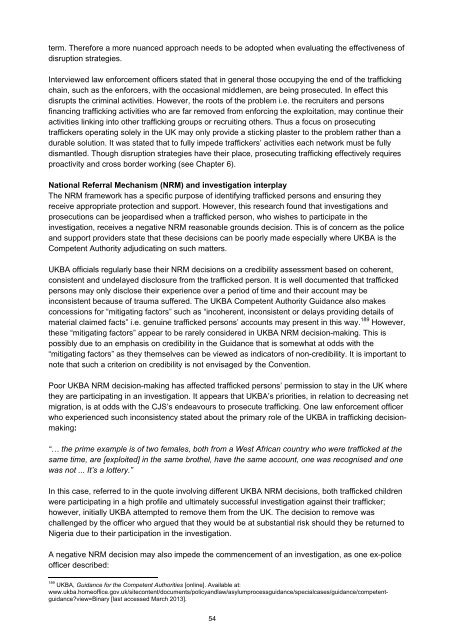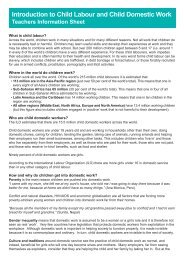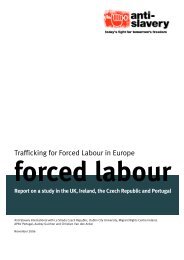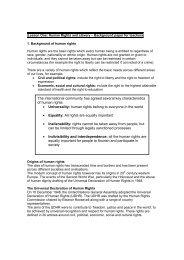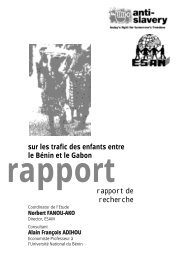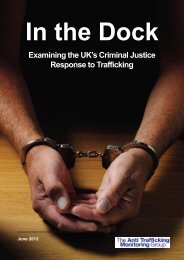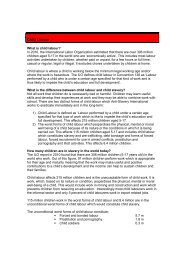term. Therefore a more nuanced approach needs to be adopted when evaluating <strong>the</strong> effectiveness ofdisruption strategies.<strong>In</strong>terviewed law enforcement officers stated that in general those occupying <strong>the</strong> end of <strong>the</strong> traffickingchain, such as <strong>the</strong> enforcers, with <strong>the</strong> occasional middlemen, are being prosecuted. <strong>In</strong> effect thisdisrupts <strong>the</strong> criminal activities. However, <strong>the</strong> roots of <strong>the</strong> problem i.e. <strong>the</strong> recruiters and personsfinancing trafficking activities who are far removed from enforcing <strong>the</strong> exploitation, may continue <strong>the</strong>iractivities linking into o<strong>the</strong>r trafficking groups or recruiting o<strong>the</strong>rs. Thus a focus on prosecutingtraffickers operating solely in <strong>the</strong> UK may only provide a sticking plaster to <strong>the</strong> problem ra<strong>the</strong>r than adurable solution. It was stated that to fully impede traffickers’ activities each network must be fullydismantled. Though disruption strategies have <strong>the</strong>ir place, prosecuting trafficking effectively requiresproactivity and cross border working (see Chapter 6).National Referral Mechanism (NRM) and investigation interplayThe NRM framework has a specific purpose of identifying trafficked persons and ensuring <strong>the</strong>yreceive appropriate protection and support. However, this research found that investigations andprosecutions can be jeopardised when a trafficked person, who wishes to participate in <strong>the</strong>investigation, receives a negative NRM reasonable grounds decision. This is of concern as <strong>the</strong> policeand support providers state that <strong>the</strong>se decisions can be poorly made especially where UKBA is <strong>the</strong>Competent Authority adjudicating on such matters.UKBA officials regularly base <strong>the</strong>ir NRM decisions on a credibility assessment based on coherent,consistent and undelayed disclosure from <strong>the</strong> trafficked person. It is well documented that traffickedpersons may only disclose <strong>the</strong>ir experience over a period of time and <strong>the</strong>ir account may beinconsistent because of trauma suffered. The UKBA Competent Authority Guidance also makesconcessions for “mitigating factors” such as “incoherent, inconsistent or delays providing details ofmaterial claimed facts” i.e. genuine trafficked persons’ accounts may present in this way. 189 However,<strong>the</strong>se “mitigating factors” appear to be rarely considered in UKBA NRM decision-making. This ispossibly due to an emphasis on credibility in <strong>the</strong> Guidance that is somewhat at odds with <strong>the</strong>“mitigating factors” as <strong>the</strong>y <strong>the</strong>mselves can be viewed as indicators of non-credibility. It is important tonote that such a criterion on credibility is not envisaged by <strong>the</strong> Convention.Poor UKBA NRM decision-making has affected trafficked persons’ permission to stay in <strong>the</strong> UK where<strong>the</strong>y are participating in an investigation. It appears that UKBA’s priorities, in relation to decreasing netmigration, is at odds with <strong>the</strong> CJS’s endeavours to prosecute trafficking. One law enforcement officerwho experienced such inconsistency stated about <strong>the</strong> primary role of <strong>the</strong> UKBA in trafficking decisionmaking:“… <strong>the</strong> prime example is of two females, both from a West African country who were trafficked at <strong>the</strong>same time, are [exploited] in <strong>the</strong> same bro<strong>the</strong>l, have <strong>the</strong> same account, one was recognised and onewas not ... It’s a lottery.”<strong>In</strong> this case, referred to in <strong>the</strong> quote involving different UKBA NRM decisions, both trafficked childrenwere participating in a high profile and ultimately successful investigation against <strong>the</strong>ir trafficker;however, initially UKBA attempted to remove <strong>the</strong>m from <strong>the</strong> UK. The decision to remove waschallenged by <strong>the</strong> officer who argued that <strong>the</strong>y would be at substantial risk should <strong>the</strong>y be returned toNigeria due to <strong>the</strong>ir participation in <strong>the</strong> investigation.A negative NRM decision may also impede <strong>the</strong> commencement of an investigation, as one ex-policeofficer described:189UKBA, Guidance for <strong>the</strong> Competent Authorities [online]. Available at:www.ukba.homeoffice.gov.uk/sitecontent/documents/policyandlaw/asylumprocessguidance/specialcases/guidance/competentguidance?view=Binary[last accessed March 2013].54
“[B]ecause <strong>the</strong> NRM decision is only on <strong>the</strong> balance of probabilities and if <strong>the</strong>y [<strong>the</strong> police] are lookingto prosecute [which has] to be on a higher level of proof, i.e. <strong>the</strong> beyond reasonable doubt, <strong>the</strong>n <strong>the</strong>y[<strong>the</strong> police] probably won’t continue an investigation because it’s a different level of standard of proofand if it’s failed at a lower standard of proof [balance of probabilities] <strong>the</strong>n it’s going to be incrediblydifficult to get it to <strong>the</strong> higher level of proof.”<strong>In</strong> one example presented to <strong>the</strong> ATMG, a potential trafficked person reported rape and trafficking to<strong>the</strong> police but subsequently received a negative NRM decision from UKBA. The case was submittedfor judicial review and <strong>the</strong> potential trafficked person was informed that <strong>the</strong> police would not proceedwith an investigation unless <strong>the</strong> judicial review was successful. The police also stated that UKBA hadalready undertaken an investigation and found <strong>the</strong>m not to be trafficked and <strong>the</strong>refore <strong>the</strong>y would notduplicate <strong>the</strong> investigation carried out by UKBA. This seems to be contradicted by <strong>the</strong> position that if<strong>the</strong> judicial review is successful <strong>the</strong> police will investigate. The ATMG has learnt that this is not anisolated case of a trafficking investigation being dependent on a conclusive grounds decision.Fur<strong>the</strong>rmore, UKBA does not share with <strong>the</strong> police intelligence from NRM referral forms or asylumapplications where trafficking is raised. This, in part, is due to victim confidentiality which is animportant element of <strong>the</strong> Convention and Directive. However, it has been suggested that this may beovercome by inserting a clause in <strong>the</strong> NRM form which trafficked persons can tick to indicate that <strong>the</strong>irinformation can be shared with <strong>the</strong> police. This must be strictly obtained with <strong>the</strong> fully informedconsent of <strong>the</strong> trafficked person. Fur<strong>the</strong>rmore, <strong>the</strong>y must understand how <strong>the</strong>ir information will beused and <strong>the</strong> possible implications of sharing such information.<strong>In</strong> o<strong>the</strong>r instances <strong>the</strong> decision made in NRM referral forms completed by <strong>the</strong> police was notcommunicated back to officers, which affected case planning. <strong>In</strong> one recent case, a legal practitioner,representing a trafficked woman brought to <strong>the</strong> UK for sexual exploitation, pointed out to <strong>the</strong> policethat <strong>the</strong> information UKBA holds on persons travelling to and from <strong>the</strong> UK can include biometric dataon potential traffickers, including <strong>the</strong>ir client’s trafficker. <strong>In</strong>itially <strong>the</strong> police responded negatively to thisbecause of <strong>the</strong> general difficulties in obtaining intelligence from UKBA.<strong>In</strong>terpretersParticipants from all stakeholder groups reported difficulties in using interpreters. 190 <strong>In</strong>correctinterpretation can erode <strong>the</strong> investigation, resulting in lost or misunderstood information. Problemscommonly cited by participants include: interpreters allocated to cases who spoke similar but not <strong>the</strong>same dialect resulting in incorrect information being received; lack of interpreters who spoke raredialects; paraphrasing where verbatim interpretation is required; interpreters being uncomfortable orunable to interpret sensitive subject matters, particularly sexual content or cases involving Juju;discrimination or tensions in situations when interpreter and victim are from different ethnic, cultural,class or religious backgrounds (also see Chapter 9 for child-specific issues). Moreover, as policeperception can affect <strong>the</strong> trafficked person’s behaviour (see below), so can interactions withinterpreters if <strong>the</strong>y are psychologically or emotionally unsuitable.Whilst using volunteer interpreters, family members or o<strong>the</strong>r victims to interpret may save costs andtime, this should be avoided unless absolutely necessary, as <strong>the</strong>re is a risk that <strong>the</strong>y may beconnected with <strong>the</strong> trafficking network. To avoid problems with interpreters it is good practice to use<strong>the</strong> same interpreter throughout so as to restore a sense of stability for <strong>the</strong> trafficked person as well asobtaining feedback from <strong>the</strong>m afterwards to ensure <strong>the</strong>y are happy with <strong>the</strong> interpreter’s services.On 30 January 2012 <strong>the</strong> Government restricted interpreter services in England and Wales to a singleagency, Applied Language Solutions. This exercise was said to reduce interpreter and translationcosts by £18m per year while interpreter allocation would be more effective. This has caused190An interpreter interprets speech, while a translator translates writing from one language to ano<strong>the</strong>r.55
- Page 1 and 2:
In the DockExamining the UK’s Cri
- Page 3 and 4:
AcknowledgementsThis report was mad
- Page 5 and 6: PrefaceIn May 2009, a group of nine
- Page 7 and 8: Misconceptions around exploitation
- Page 9 and 10: Acronyms and abbreviations frequent
- Page 11 and 12: Executive SummaryIn the Dock is The
- Page 13 and 14: Furthermore, the current legislatio
- Page 15 and 16: The ATMG was made aware of some cas
- Page 17 and 18: • Introduce mandatory child-speci
- Page 19 and 20: • The UK’s ability to meet the
- Page 21 and 22: Traffickers’ primary motivation i
- Page 23 and 24: • Money launderers - turn profits
- Page 25 and 26: out to perpetuate the exploitative
- Page 27 and 28: [their] own enslavement” is as fu
- Page 29 and 30: Chapter 2: UK Anti-Trafficking Legi
- Page 31 and 32: nationals who commit trafficking of
- Page 33 and 34: Like the SOA, the “act” element
- Page 35 and 36: (b) D requires another person to pe
- Page 37 and 38: Forced or compulsory labourThe defi
- Page 39 and 40: ConclusionAs a consequence of the s
- Page 41 and 42: concerningly, the number of convict
- Page 43 and 44: women who were recruited in Poland
- Page 45 and 46: Chapter 4: Identifying trafficking
- Page 47 and 48: Misconceptions around exploitationT
- Page 49 and 50: espond inadequately to a trafficked
- Page 51 and 52: multi-agency teams was described by
- Page 53 and 54: Josie Connors. 179 In summary, inte
- Page 55: defending a trafficked person for f
- Page 59 and 60: PTSD. 196 A Consultant Psychiatrist
- Page 61 and 62: etween the client and the police, i
- Page 63 and 64: Regular communication needs to be s
- Page 65 and 66: Priority planningA particular issue
- Page 67 and 68: Chapter 6: Multi-agency and interna
- Page 69 and 70: canvassing for tarmacking opportuni
- Page 71 and 72: Despite this, it would appear that
- Page 73 and 74: Good practice - Operation Golf 229O
- Page 75 and 76: Chapter 7: Criminal proceedingsThe
- Page 77 and 78: Law enforcement working on the case
- Page 79 and 80: trafficking require particular unde
- Page 81 and 82: JuryPractitioners suggested that th
- Page 83 and 84: years”. 258 Ambiguity within the
- Page 85 and 86: officer stated that not all judges
- Page 87 and 88: jurors to be assisted with expert e
- Page 89 and 90: Good feedback was received from sem
- Page 91 and 92: The Convention does recognise that
- Page 93 and 94: Another option for trafficked victi
- Page 95 and 96: There are two models with respect t
- Page 97 and 98: 1. Is there clear evidence that the
- Page 99 and 100: decision can be taken into account
- Page 101 and 102: also entails being “alert to the
- Page 103 and 104: In some cases concerns were even ra
- Page 105 and 106: Chapter 9: Prosecuting child traffi
- Page 107 and 108:
However, many children are not refe
- Page 109 and 110:
trafficking”. 352 It states: “W
- Page 111 and 112:
Previous research has found that th
- Page 113 and 114:
children as well as assisting in pr
- Page 115 and 116:
Child trafficking trainingThere is
- Page 117 and 118:
were too traumatic to involve them
- Page 119 and 120:
committed by a child whilst in a co
- Page 121 and 122:
• Introduce mandatory child-speci
- Page 123 and 124:
IdentificationThe PSNI is the main
- Page 125 and 126:
participants suggest that this is b
- Page 127 and 128:
The PPS stated that the reasons for
- Page 129 and 130:
this research was aware of potentia
- Page 131 and 132:
convictions of traffickers prosecut
- Page 133 and 134:
Possibly in response to certain hur
- Page 135 and 136:
espectively. In addition to custodi
- Page 137 and 138:
Conclusion and RecommendationsThe A
- Page 139 and 140:
CRIMINAL PROCEEDINGS• Ensure that
- Page 141 and 142:
Crown Prosecution Service, Legal Gu
- Page 143 and 144:
Herman. J. Trauma and Recovery: The
- Page 145 and 146:
Annex I: Trafficking and other form
- Page 147 and 148:
(a) on summary conviction, to impri
- Page 149 and 150:
(b) which country is the country of
- Page 151 and 152:
2009 Istvan Kalocsai (Snr)MetS.57 o
- Page 153 and 154:
2009 causing actual bodily harm, su
- Page 155 and 156:
Skirmantas Kvedaras Feed, 2010 Rape
- Page 157 and 158:
2012 Ahdel Ali (24)Mubarek Ali (29)
- Page 159 and 160:
Annex III: The CPS’s Seven Stages
- Page 161 and 162:
159


